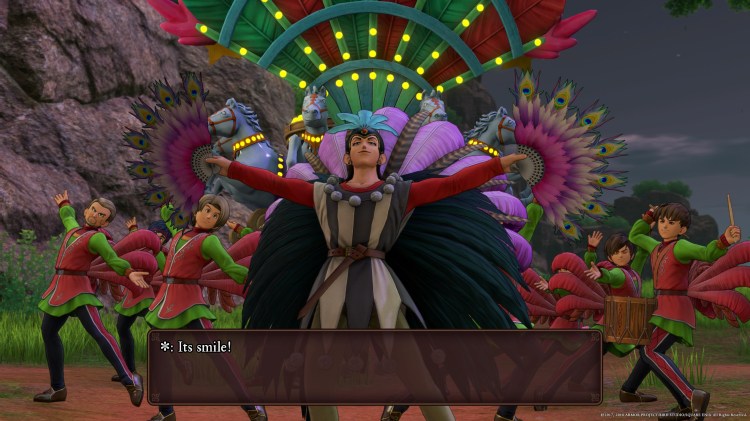It’s been more than 32 years since the first slime appeared in Dragon Warrior (the original name for Dragon Quest in the West). Since then, its charm, embrace of tradition, and high-fantasy adventures have made it one of my favorite role-playing series in all of gaming.
Dragon Quest XI: Echoes of an Elusive Age brings the Japanese RPG franchise (one that’s always been far more popular in Japan than on American or European shores) into the 21st century, adding several improvements that help make the grind (that’s fighting lots of random battles to earn experience and treasure to make your characters stronger) easier on you. It debuted in Japan last year, selling more than 3 million copies on the PlayStation 4 and Nintendo 3DS in a market that long ceded its once dominant position to mobile gaming.
The series is so old that now folks who are helping craft its future are younger than the original game. But they love Dragon Quest and everything the series is about, and you can see it here in Dragon Quest XI: Echoes of an Elusive Age, which may now be one of my favorites in the franchise’s 32-year history. It tells a story of sorrow and hope, of people finding the strength to overcome their grief, to overcome remarkable odds. It’s been a long time since a Japanese RPG moved me in such a way.
Here’s how it does so.
June 5th: The AI Audit in NYC
Join us next week in NYC to engage with top executive leaders, delving into strategies for auditing AI models to ensure fairness, optimal performance, and ethical compliance across diverse organizations. Secure your attendance for this exclusive invite-only event.
Check out our Reviews Vault for past game reviews.
What you’ll like
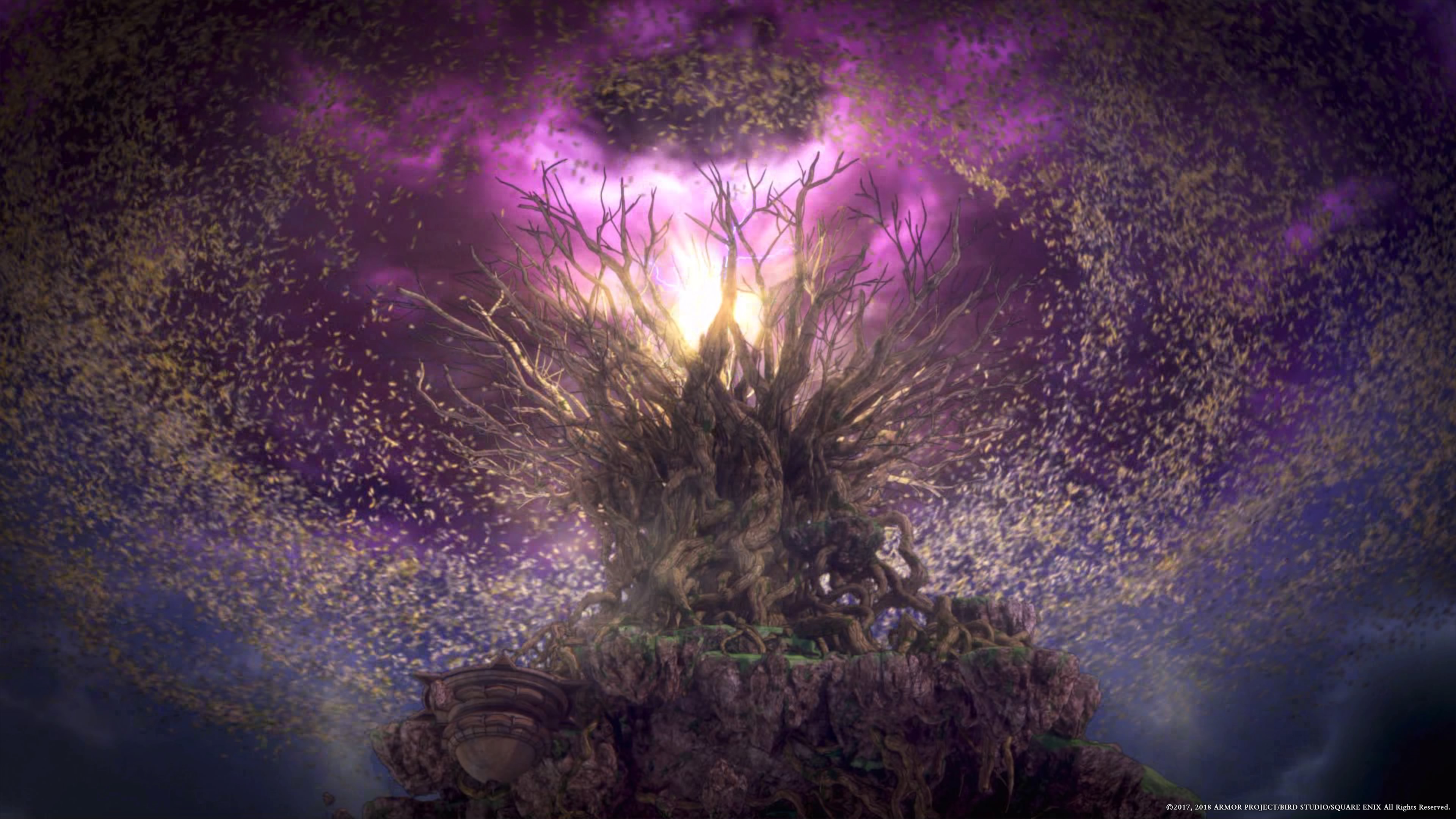
Above: Someone forgot to pay the gardener to take care of the giant sky tree this month.
Despair and hope
You start full of hope and excitement as the Luminary, a legendary hero with the power to save the world. But reality strikes swift, as the ruler of the Kingdom of Heliodor brands you as a threat to the world, not its savior, and you take off on a frantic chase to evade capture.
Once you’ve left behind Heliodor and its goons, you set off on a world-spanning adventure. You make friends, save kingdoms, take part in a horse race and a fighting tournament, visit the center of all life in the World Tree, and even see if the fish are happy under the sea (I wish more fantasy games sent its heroes under water for adventures). And you have to save the realm, of course.
But what strikes me about this journey (plan 70 hours or more for it, by the way) is how often a quest moved me. The tale of the fisherman and the mermaid broke my heart, and my surprise at its end was genuine. Later, you draw strength from the mermaid queen, who’s steadfast in her desire to help you save the world. But it’s heartbreaking when you realize that she’s buying time for you to escape unseen by the Lord of Shadows’ monsters.
My heart saddened several other times: When you realize the depths of the betrayal by Helidor’s king, and why it occurs; the trepidation the confident, joyful Sylvando feels as he prepares to meet a father he spurned years ago; how one gladiator embraces the darkness to help orphans; or the realization of the heartbreak that Jade and Rab (two of your other companions) has carried with him for nearly 20 years.
Yet Square Enix made sure that my hankie wouldn’t be my constant companion. When you liberate Heliodor from the forces of darkness, you feel like the hero of legend. Watching how Sylvando decides to bring smiles to the world after darkness descends is a hoot. Reuniting family and friends warms your heart.
And, of course, the puns. Nothing makes me smile in Dragon Quest as the puns do. Horses matter in Gallopolis. Octogonia is all about the MMA. But wait, there’s more, like fighters whose special attacks are all about slamming you with their rear ends (my children still laugh about this three weeks later).
Like most Dragon Quests, Echoes of an Elusive Age does a fantastic job of tugging at your heart, making your sad after one quest and lifting your spirits with the next.
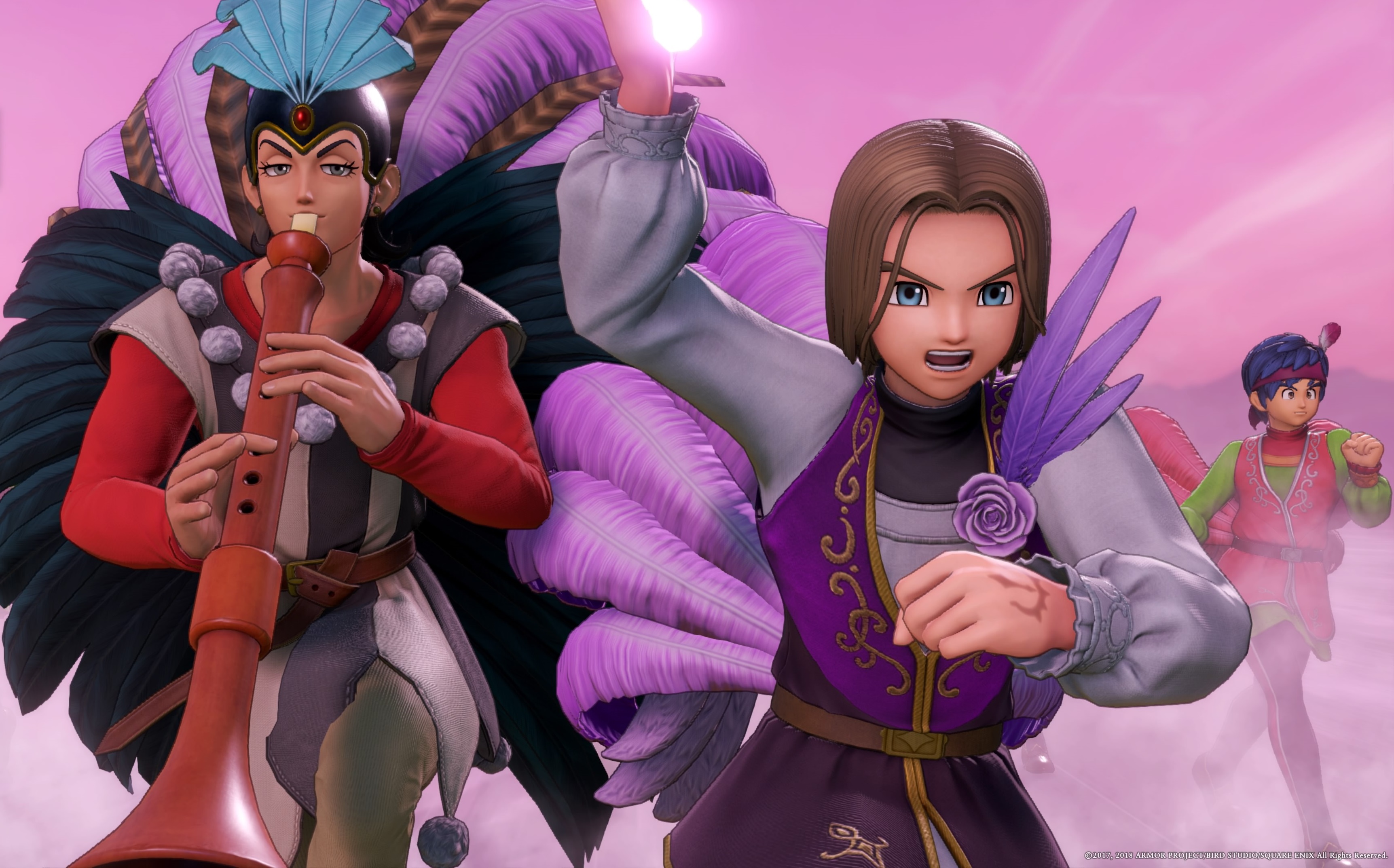
Above: Sylvando (playing the horn here) and his cheerful strength are always a highlight.
Sylvando
He’s my favorite character in the ensemble, ever ready with a sassy quip or to save someone in need. He joins as a sort-of worldly jester, happy to school the privileged on their shortcomings. But as the story unfolds, you find great pain hides under his bubbly personality.
His can-do attitude and love and support for those in need are his most endearing qualities. He’s ready to save a lost girl, who’s in tears as she fails to find her parents. And when his actions lead you into a devilish trap, I didn’t mind, because I knew that Sylvando was just trying to do the right thing, making the same decision I would’ve done. Much later, he acquires an entourage of sorts, and when it’s time to rejoin you on your quest to save the world, he faces the pain of his past in order to make sure his new followers are safe and cared for once he leaves them.
He’s also over-the-top, bringing to mind Nathan Lane’s Albert. He’s effeminate and flamboyant, but dammit, isn’t he one of the strongest characters in your party. He’s ready to stand up for what’s right, to protect those in need.
The Fun-Sized Forge
I never got into the cookpot in Dragon Quest VIII. I just didn’t bother finding recipes. XI’s designers must have felt the same — they kept the recipe portion, but instead of throwing items into a pot, you craft items on a forge. And I enjoyed the minigame. Each item has up to six metered squares. Hit the square, and the meter increases toward the sweet spot. Hit it and you’re golden there. Finish too far under or over, and you ruin the item.
You use a mix of soft and light hammer hits, strike that hit multiple times or squares, and puffs of air that heat up the forge (giving your hits better results) to craft an item. Do well, and you save some gold by crafting a new set of armor or fancy earring. Finishing within one or more sweet spots leads to improved items, such as a +1 sword or a +2 shield.
You find recipes in books around Erdea, so be sure to look in every room to see if any red books line the bookshelf. Even if they don’t have recipes, you’ll learn a bit about the five kingdoms of this world.
A better grind
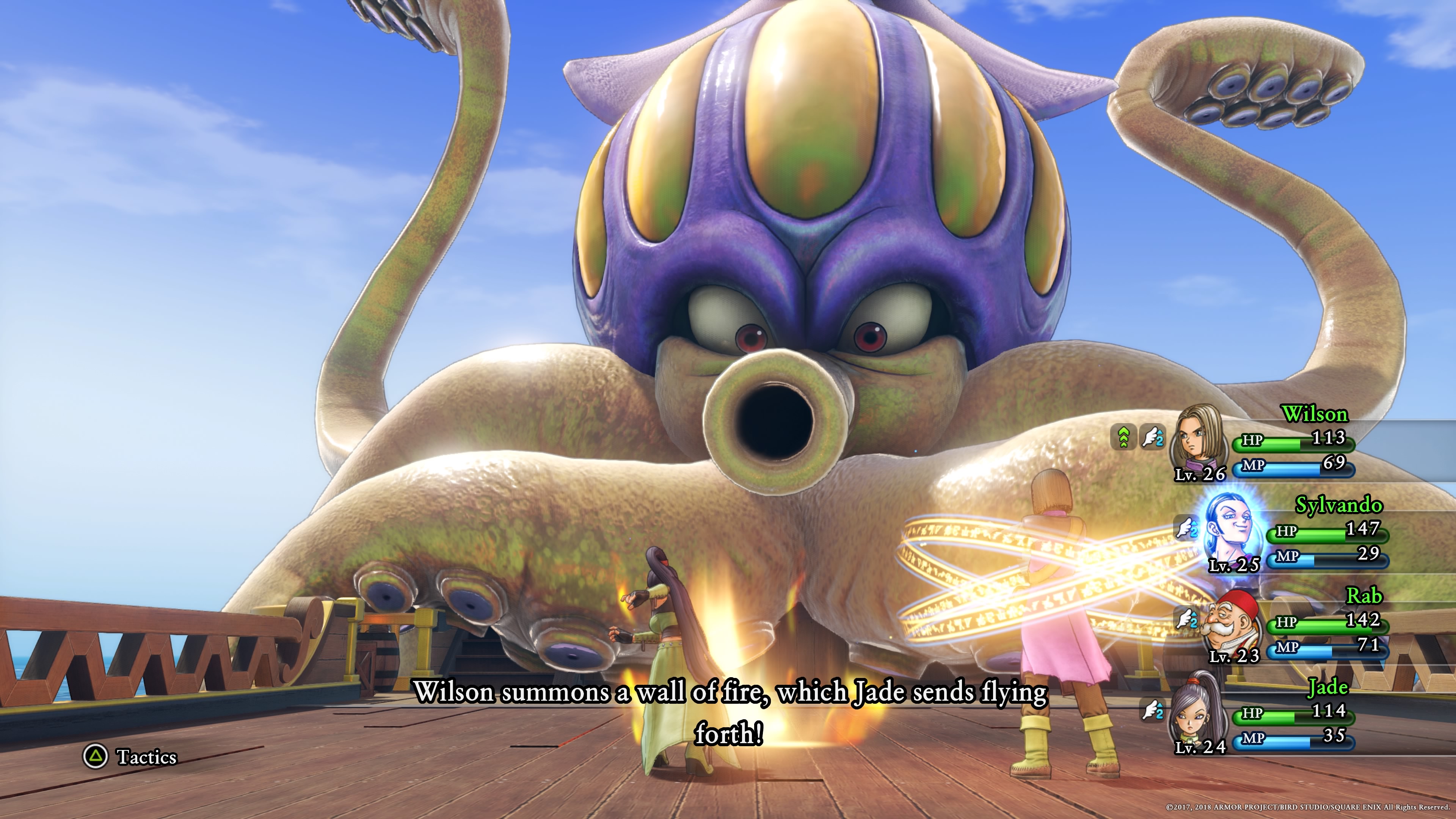
Above: This fight against a giant squid monster was the closest I came to a party wipe, losing five of my seven heroes.
Plan for more than 70 hours to polish off this story. But if my adventure is any indication, you won’t spend much of this time grinding for experience. In every new area, I gathered more than enough experience to defeat the region’s boss and move on with the story. I never had to spend time defeating monsters just to level up to beat more serious threats. Now, that said, I enjoy Dragon Quest’s turn-based combat, so I spent more time fighting monsters than others might.
Random encounters are gone, too. Every critter roams the map, and most of the time, you can choose whether or not to fight. And now that you have a dash button — one without a stamina meter — you can get around cities, dungeons, and the map quicker, too, along with outrunning monsters that chase you.
Camps and horses also make your Dragon Quest adventure easier to manage. Camps are sites in the wilderness where you can rest and regain your health and magic points, create or improve items at the Fun-Sized Forge, buy gear and items at a roving merchant, and most importantly, save your progress. Horses are a speedy way to travel, but they also smack most enemies out of the way while traveling. You don’t receive any experience for doing so. I enjoyed launching slimes and drackys into the air as I speed through an area on my steed.
I also enjoy the new presentation for skills. Before, it was just a text user interface, and you put skills into the areas you wanted: swords, staffs, etc. Now, it’s a graphical grid, reminiscent of Final Fantasy XII’s presentation. The options radiate from a central point, and unlocking one can open other paths. What I like here is that some boarder on others, so putting points into those two areas can open up new regions.
What you won’t like
There and back again … and again
After putting in nearly 35 hours of building my party and accomplishing what I thought was the main quest, Dragon Quest XI casts down the world, and it’s your job to defeat the victorious Lord of Shadows.
Except this feels like history repeating, as you awake from the cataclysm all alone. You set out to find your friends, people who took you dozens of hours to find and assemble as a party the first time around. Doing so again feels … tedious at times, and with the exception of Sylvando’s plot, none of your friends’ stories feel like they add a tremendous amount to the plot.
Misplaced looting
A mainstay of role-playing games is going into every home and building to find chests and other goodies hiding in pots and containers. But some of these looting locations are in places that just don’t make sense with the story. After the tale of the fisherman and the mermaid, one that moved me to sadness, you next action can be looting a hut for … a pearl. After reuniting Sylvando and his father, you can snag a weak armor set out of the bureau in the room.
Of course, you can skip this. And it’s a minor compliant. But why even put stuff to loot where emotion and story intersect? Why not create a place where the player can reflect on what has just happened?
Conclusion
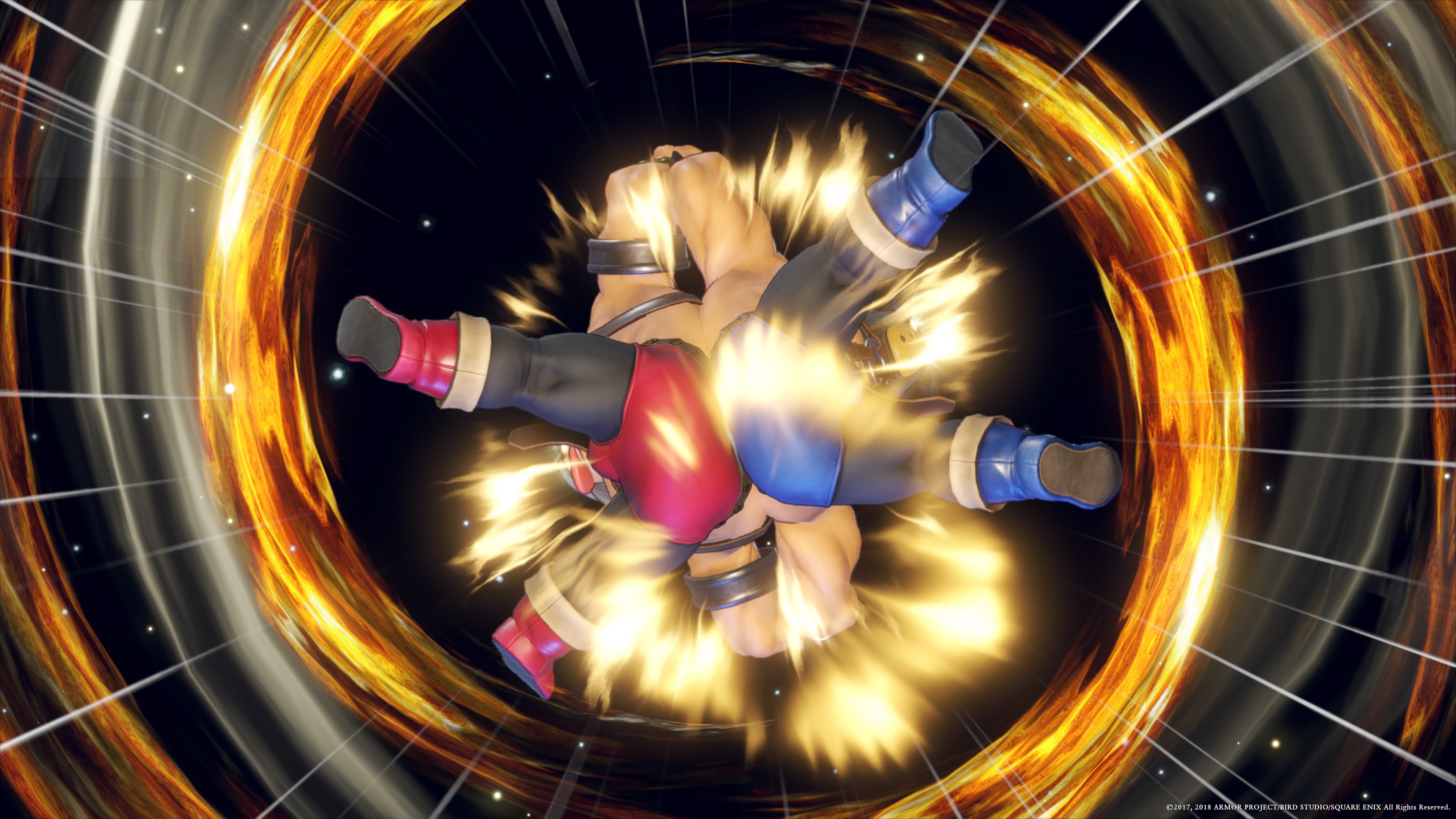
Above: This butt-slam is now famous in my house.
Dragon Quest XI: Echoes of an Elusive Age moved me in ways a Japanese RPG hasn’t done in years. Its story chronicles the hope and sorrow of its characters as they seek to save their world from darkness, showing their strengths and how they use them to overcome their weaknesses. It streamlines some of the more hidebound traditions of Dragon Quest’s combat and travel systems, and the result is a game that’s just a joy to play. It looks good, it sounds good, and it plays well.
And judging from my children’s reactions, Dragon Quest XI is rightly positioned to bring in new fans as well as tighten its embrace on folks like me, who have loved the series for years. The kiddos are ready to take the PS4 over and play now that my review is over. And I’m fine with that.
Just as long as they watch out for those buttslams.
Score: 92/100
Dragon Quest XI: Echoes of an Elusive Age releases September 4 on Steam and the PlayStation 4. The publisher sent GamesBeat a digital PS4 code for the purposes of this review.
